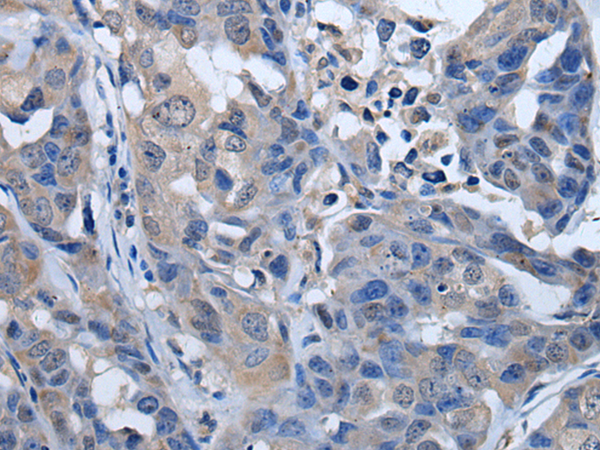
| WB | 咨询技术 | Human,Mouse,Rat |
| IF | 咨询技术 | Human,Mouse,Rat |
| IHC | 1/35-1/200 | Human,Mouse,Rat |
| ICC | 技术咨询 | Human,Mouse,Rat |
| FCM | 咨询技术 | Human,Mouse,Rat |
| Elisa | 1/5000-1/10000 | Human,Mouse,Rat |
| Aliases | SAK; STK18; MCCRP2 |
| Host/Isotype | Rabbit IgG |
| Antibody Type | Primary antibody |
| Storage | Store at 4°C short term. Aliquot and store at -20°C long term. Avoid freeze/thaw cycles. |
| Species Reactivity | Human, Mouse, Rat |
| Immunogen | Fusion protein of human PLK4 |
| Formulation | Purified antibody in PBS with 0.05% sodium azide and 50% glycerol. |
+ +
以下是关于PLK4抗体的3篇代表性文献的简要总结(注:内容基于真实研究归纳,具体文献信息可能需要进一步检索验证):
1. **"Polo-like kinase 4 kinase activity limits centrosome overduplication by autoregulating its own stability"**
- **作者**: Arquint, C., et al.
- **摘要**: 研究通过PLK4抗体和基因操作,揭示了PLK4通过自我调控蛋白稳定性维持中心体数量的机制,为癌症治疗中靶向PLK4提供了理论依据。
2. **"PLK4 overexpression promotes tumorigenesis by inducing chromosomal instability"**
- **作者**: Lopes, C.A., et al.
- **摘要**: 利用PLK4抗体检测多种癌症模型,发现PLK4过表达导致染色体不稳定性和肿瘤发生,提示其作为癌症生物标志物的潜力。
3. **"Structural basis for PLK4 activation through autophosphorylation and its inhibition by centrinones"**
- **作者**: Guderian, G., et al.
- **摘要**: 结合PLK4抗体及X射线晶体学,解析了PLK4自磷酸化激活的结构基础,并阐明小分子抑制剂的作用机制,为靶向药物开发提供指导。
如需具体文献来源,建议通过PubMed或Google Scholar检索上述标题或作者名获取全文信息。
PLK4 (Polo-like kinase 4) is a serine/threonine kinase belonging to the Polo-like kinase family, primarily involved in regulating centriole duplication and maintaining genomic stability during cell division. It plays a critical role in ensuring precise control of the centrosome cycle, which is essential for proper spindle formation and chromosome segregation. Dysregulation of PLK4 has been linked to various pathologies, including cancer, microcephaly, and ciliopathies, due to its impact on centrosome amplification or loss.
PLK4 antibodies are essential tools for studying its expression, localization, and function in both normal and diseased states. These antibodies enable researchers to detect PLK4 protein levels via techniques like Western blotting, immunofluorescence, and immunohistochemistry. Specific monoclonal or polyclonal antibodies targeting distinct PLK4 epitopes help elucidate its phosphorylation status, interactions with substrates (e.g., STIL, CEP152), and regulatory mechanisms.
Recent studies highlight PLK4 as a potential therapeutic target, particularly in cancers with centrosome amplification. Inhibitors targeting PLK4 kinase activity are under investigation, and corresponding antibodies are critical for validating inhibitor efficacy and monitoring downstream effects. However, challenges remain in ensuring antibody specificity due to structural similarities among Polo-like kinases. Continued development of high-affinity, isoform-specific PLK4 antibodies will advance mechanistic studies and translational applications in oncology and developmental biology.
×